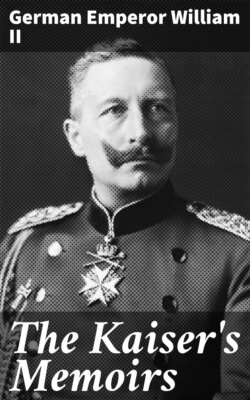Читать книгу The Kaiser's Memoirs - German Emperor William II - Страница 13
На сайте Литреса книга снята с продажи.
GERMANY AS PEACEMAKER
ОглавлениеTable of Contents
One must also lay stress upon the fact that it was a German statesman who, in 1878, prevented a general war, even at the cost of weakening the relations of Germany to Russia, in the justified belief that he would succeed, being a statesman of genius who knew exactly what he was aiming at, in strengthening these relations once more, or, at least, in avoiding conflicts after he had overcome the crisis threatening all Europe.
He succeeded in doing that for twelve years and his successors at the helm of the ship of state succeeded in doing likewise for twenty-four more years.
When I was a Prince I purposely held aloof from party politics, concentrating my entire attention upon my duties in the different army branches to which I was assigned. This afforded me satisfaction and filled up my whole life. For this reason I avoided, while I was Prince of Prussia, all attempts to drag me into party activities. Often enough endeavors were made, under the cloak of harmless functions, teas and the like, to ensnare me into political circles or for electioneering purposes. But I always held aloof.
The outcome of the treacherous malady which killed Emperor Frederick III was frankly told me in advance by German physicians called into consultation as experts by the English physician, Sir Morell Mackenzie. My deep grief and sorrow were all the greater because it was almost impossible for me to speak alone with my beloved father. He was guarded like a prisoner by the English physicians and, though reporters from all countries could look upon the poor sick man from the physicians' room, every kind of obstacle was placed in my path to keep me from my father's side and even to prevent me from keeping in constant touch with him by writing; my letters were often intercepted and not delivered. Moreover, from among the group of watchers, an infamous, organized campaign of slander was conducted in the newspapers against me. Two journalists were especially active in this: one Herr Schnidrowitz and M. Jacques St. Cère, of the Figaro—a German Jew—who slandered him who was later Emperor in the most poisonous way in France, until the "Petit Sucrier" trial put an end to his activities.
I gave the dying Emperor his last joy on earth when I had the Second Infantry Brigade march past him, led by me in person. These were the first and last troops seen by Frederick III as Emperor. He delighted his son by writing on this occasion, on a little card, that he was grateful for having had the pleasure of seeing these troops and proud to call them his own. This event was a ray of light during the gloomy ninety-nine days, which brought upon me also, as Crown Prince, much grief, humiliation, and suspicion. In fulfillment of my duty during this crisis, I kept a watchful eye upon all happenings in military, official, and social circles, and was inwardly outraged at the signs of slackness which I noted everywhere, most especially at the hostility against my mother, which was becoming more and more noticeable. Moreover, I was naturally deeply hurt at the constant campaign of slander directed against me which depicted me as living in discord with my father.
